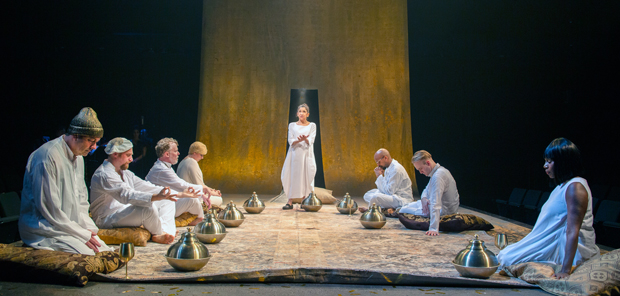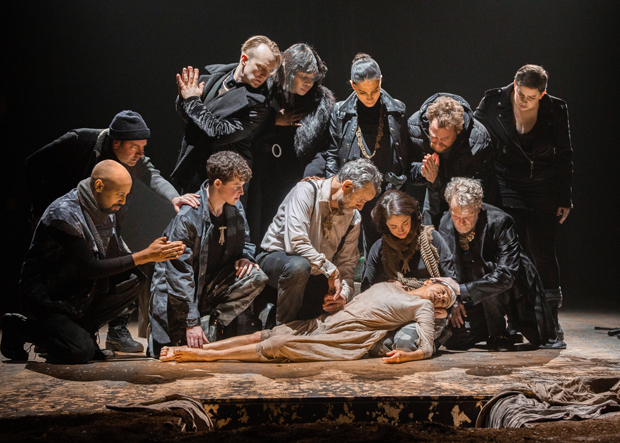Contemplating Two Philosophical Extremes in Timon of Athens
Kathryn Hunter stars in Simon Godwin’s new production of a lesser-known Shakespeare play at Theatre for a New Audience.

(© Henry Grossman)
Timon of Athens, a rarely performed William Shakespeare play that many scholars believe he cowrote with Thomas Middleton, is a tragicomedy that encompasses two philosophical and psychological extremes. Timon, a rich and exceedingly generous nobleman, starts off the play believing in the essential goodness of humanity. By the play's second half, after enduring a series of betrayals that destroys his faith in people, he has wholly embraced misanthropy.
If it lacks the richness of King Lear, which tells a similar story of disillusionment, there's nevertheless an intriguing purity to the elemental nature of Timon of Athens, as if Shakespeare wanted to be as direct as possible in articulating his views on the highs and lows of which humanity is capable. New York audiences now have an opportunity to acquaint themselves with this work in Simon Godwin's solid if messy new production at Theatre for a New Audience's Polonsky Shakespeare Center.
Following on the heels of the recent Broadway production of King Lear, which featured Glenda Jackson in the traditionally male role of the fallen king, Godwin's production likewise stars Kathryn Hunter as Timon. Right in the play's opening dinner scene, Hunter warmly conveys Timon's innocence and desire to please as she basically tosses money at her flattering friends upon their request.

(© Henry Grossman)
This generosity comes in spite of both the quiet concern of her servant Flavius (John Rothman, exuding both firmness and devotion) that she's spending beyond her means and the caustic vocal commentary of philosopher Apemantus (Arnie Burton, enjoyably acidic in his tirades), warning Timon incessantly of how untrustworthy her supposed buddies are. Apemantus's admonitions prove painfully correct when Timon's servants try to solicit money from those same friends to help her out of her sticky financial situation and they all look the other way.
After a second dinner scene in which Timon turns the tables on her betrayers by serving them bowls of blood instead of a full meal, Timon flees into the nearby woods and renounces society. Even when she happens upon a chest of gold coins in the woods, she uses it to try to seduce various figures — including loyal Alcibiades (Elia Monte-Brown, full of spit and vinegar), a rebel leader trying to figure for the rights of the suffering and dispossessed just outside of Athens — to occasion Athens's destruction.
Befitting a play that explores the implications of either accepting or rejecting humanity, Godwin's production embraces stark visual contrasts. The gleaming gold colors of Soutra Gilmour's scenic design in the play's first half, with Donald Holder's lighting delineating changes in scene and atmosphere, gives way to the earthy tones of its second half, with a tall tree overlooking the stage like a monolith. Gilmour's costume designs are similarly wide-ranging, though having the cynical philosopher Apemantus donning a Patti Smith T-shirt to stand out from the rest of the pack in more glitzy period-appropriate attire arguably goes a bridge too far.

(© Henry Grossman)
But then, Godwin's production as a whole plays as a grab bag of bold conceptual half-measures. The inclusion of a Greek singer (Kristen Misthopoulos) as part of the cast performing a musical setting (composed by Michael Bruce, who wrote the original music for the production) of Shakespeare's Sonnet 53 ("What is your substance, whereof are you made…?") at a couple of moments is an interestingly foreboding interpolation. So is Godwin's decision to have Timon serve her two-timing friends blood instead of the rocks specified in the original text, an especially effective touch when Timon splashes some of that blood onto the guests' white outfit.
But turning Alcibiades from an army captain in the original text into an activist fighting for the rights of the lower classes doesn't necessarily add anything other than a token gesture of topical relevance for a play that is otherwise mostly concerned with the travails of one especially wealthy, and extravagantly vengeful, one-percenter.
Still, this is a very entertaining production, brought to life by eye-catching design and a committed, energetic cast. At the center of it all is Hunter, who binds both halves of this messy play together by sheer force of personality, her diminutive frame and velvety voice masking depths of fury and despair that come to the fore in the second half. The play's exploration of the limits of naïveté and misanthropy might not cut very deep, but Hunter brings such full tragicomic weight to her performance that she demands that we pay attention nevertheless.

(© Henry Grossman)








